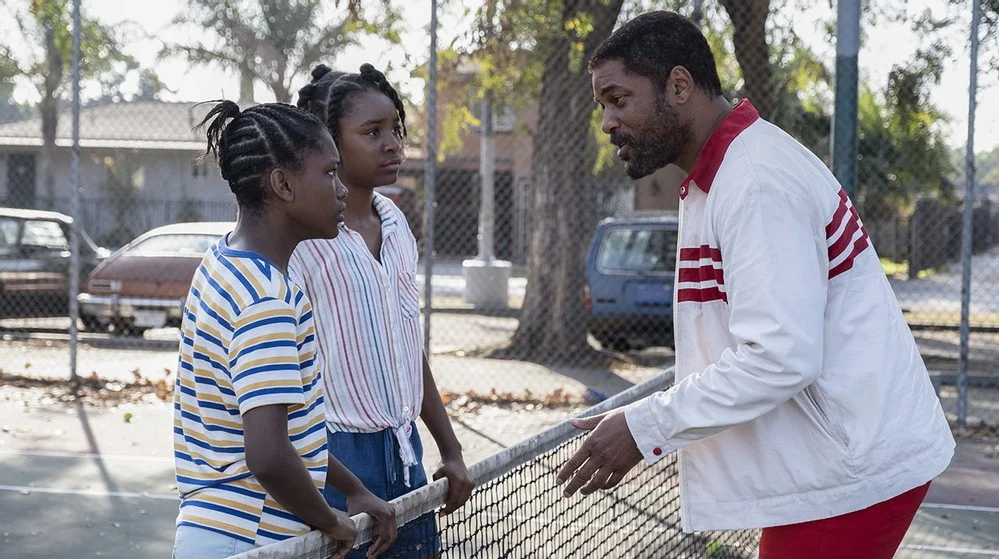VENUS AND SERENA WILLIAMS may be two of the greatest sportspeople ever. Yet it is their father who has been granted a biopic while they are still waiting for theirs. Twenty years on from playing a champion himself in “Ali”, Will Smith stars as the middle-aged Richard Williams. At the start of “King Richard”, around 1990, he shares a small bungalow in Compton, Los Angeles, with his wife Oracene “Brandy” Price (Aunjanue Ellis), his three step-daughters, and the couple’s two biological daughters, Venus (Saniyya Sidney) and Serena (Demi Singleton). During his childhood in Louisiana, Richard says, he was “too busy running from the Klan” to play tennis, but he has decided that Venus and Serena will excel at a sport which has traditionally been as white as a Wimbledon uniform.
By night, he works as a security guard at a mall, a job which allows him to sit and study coaching manuals into the small hours. By day, when Brandy goes to work as a nurse, he packs the girls into a Volkswagen camper van, drives them to whichever pock-marked public tennis court is available, and trains the ever-cheerful Venus and Serena while their ever-cheerful half-sisters sit on the sidelines and do their homework. If the Williamses ever resented this routine, “King Richard”, which credits Venus and Serena as executive producers, doesn’t admit it.
The black people in the area are not encouraging. One neighbour decides that Richard is too tough on his children, and summons the police to intervene. (The film is again squarely on Richard’s side.) A gang of hoodlums harasses him so often that the girls regularly greet their mother with a matter-of-fact “Daddy got beat up again”. The white people who live farther afield are just as unhelpful. Richard tours LA’s exclusive country clubs, handing out photocopied pamphlets to the cocktail-sipping patrons, in hope of sponsorship. The typical response: “Did you ever think about basketball?” Eventually, Venus starts entering competitions, where her pony-tailed opponents prefer to cheat than accept that she outplayed them.
Celebrating Richard’s superhuman optimism, bravado and tirelessness, the film serves up the kind of inspirational, rags-to-extreme-riches fairy tale which rallies audiences and wins awards: a bearded, greying Smith, who dims his charisma and juts out his lower lip, has been tipped for an Oscar nomination. However, the director, Reinaldo Marcus Green, and screenwriter, Zach Baylin, ensure that “King Richard” isn’t wholly conventional. It’s a slick, funny story of family togetherness and tenacity, but there are no captions to announce the date or the location of events, no major turning points or lessons learned, and—mercifully—no slow-motion shots of racquets striking balls. The film doesn’t end with the customary unalloyed triumph, either, but instead with Venus’s first professional tournament at the age of 14. Besides, Richard is a complicated, capricious hero.
As determined as he is that his daughters should be world champions, he is also determined that they should have fun, study hard at school, and have at least some taste of a normal childhood. Less admirably, he has lost contact with his offspring from a previous relationship, he is prone to inflammatory statements and his unpredictable behaviour can tip from stubbornly independent to plain annoying. In one amusing sequence, he talks Pete Sampras’s coach, Paul Cohen (Tony Goldwyn), into giving Venus free lessons, only to stand by the court with his video camera and interrupt with his own contradictory advice. Later, when he signs with another coach, the motor-mouthed Rick Macci (Jon Bernthal), he removes his daughters from lessons in Florida for a trip to Disney World.
Mr Green and Mr Baylin can’t seem to decide whether Richard knows what he is doing during these scenes. His eccentric choices prove to be spectacularly correct, but the viewer is left to make the umpire’s decision on whether he is a brilliant strategist or a deluded fool who got lucky, a devoted family man or a slippery wheeler-dealer, a king or a tennis court jester. One key part of his mythology is that he wrote a 78-page plan for his daughters’ success before they were born, but “King Richard” is too coy to show the manifesto or what was in it. Nor does it explain why he was so sure that Venus and Serena would be prodigies. The film-makers have 138 minutes to examine what was going on in his head, but they are unwilling or unable to do so. Like so many of the people Richard encounters, the best they can do is look on in bamboozled amazement as his daughters’ trophies pile up.
By The Economist





